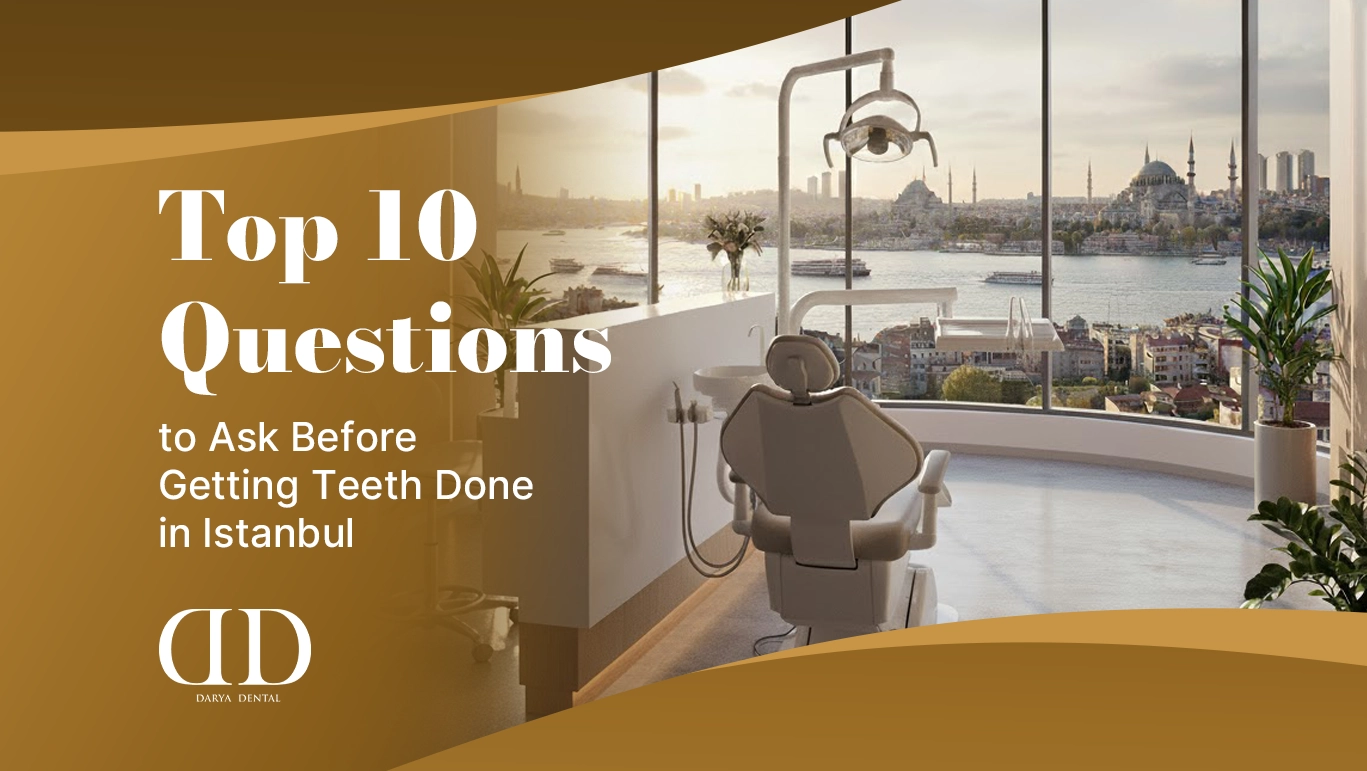Top 10 Questions to Ask Before Getting Teeth Done in Istanbul

Istanbul, Turkey, has become a global hub for dental tourism, attracting thousands of patients annually with its promise of high-quality dental treatments at 50–70% lower costs than in countries like the US, UK, or Canada. Procedures such as dental implants, veneers, and full-mouth restorations are offered by state-of-the-art clinics, often paired with the allure of exploring a vibrant city. However, choosing to get your teeth done in Istanbul requires careful planning to ensure safety, quality, and satisfaction. Asking the right questions before committing to treatment can make all the difference. This article outlines the top 10 questions to ask your dental clinic in Istanbul to ensure a successful experience, helping you achieve a confident smile while avoiding potential pitfalls.
Why Careful Planning Matters
Dental tourism in Istanbul combines affordability with advanced care, but it involves international travel, cultural differences, and medical decisions. According to the Turkish Dental Association (TDA), over 150,000 international patients visit Turkey for dental care each year, with Istanbul hosting top-tier clinics like DentSpa, Istanbul Smile Center, and HayatMed Clinic. To maximize savings and ensure quality, patients must research clinics, verify credentials, and clarify treatment details. The following questions will guide you through the process, covering qualifications, procedures, costs, and aftercare.
Top 10 Questions to Ask
1. What Are the Dentist’s Qualifications and Experience?
The expertise of your dentist is critical to the success of your treatment. Ask:
- Are the dentists certified by the Turkish Dental Association or international bodies like the International Team for Implantology (ITI)?
- How many years of experience do they have with the specific procedure (e.g., implants, veneers)?
- Have they trained or worked internationally?
For example, clinics like Maltepe Dental employ dentists with over 20 years of experience, often trained in Europe or the US. Request specific credentials or profiles of the treating dentist to ensure confidence in their skills.
2. Is the Clinic Accredited and Certified?
Accreditation ensures the clinic meets international standards for safety and quality. Ask:
- Is the clinic accredited by the Joint Commission International (JCI) or audited by the Turkish Ministry of Health?
- Do you use certified materials, such as Straumann or Nobel Biocare for implants, or E-Max for veneers?
- Can you provide proof of certifications or lab partnerships?
JCI-accredited clinics, like HayatMed Clinic, adhere to rigorous standards, ensuring sterile environments and high-quality materials. Verify certifications to avoid clinics using substandard products.
3. What Does the Treatment Package Include?
Many Istanbul clinics offer all-inclusive packages to simplify the process. Clarify:
- Does the package cover consultations, X-rays, 3D CT scans, or intraoral scans?
- Are accommodation, airport transfers, and clinic transportation included?
- What about aftercare, such as medications or follow-up consultations?
For instance, DentSpa’s VIP packages include 5–7 nights in 4-star hotels, private transfers, and lifetime implant warranties, saving patients up to 70% compared to US costs (e.g., $3,400–$10,000 for All-on-4 implants vs. $15,000–$40,000). Request a detailed breakdown to avoid hidden fees.
4. What Is the Total Cost and Payment Structure?
Transparency in pricing is essential to budget effectively. Ask:
- What is the full cost of the procedure, including diagnostics and aftercare?
- Are there additional fees for complications or revisions?
- Can I pay in installments, or are discounts available for multiple procedures?
For example, a single implant in Istanbul costs $400–$800, compared to $3,000–$5,000 in the US. Clinics like Istanbul Dental Center often offer 10–15% discounts for full-mouth restorations. Confirm payment methods (e.g., credit card, bank transfer) and currency (TRY, USD, EUR) to leverage favorable exchange rates.
5. What Materials and Technologies Are Used?
The quality of materials and technology impacts treatment durability and aesthetics. Ask:
- What brands are used for implants, crowns, or veneers (e.g., Straumann, Zirconia, E-Max)?
- Do you use digital X-rays, 3D CT scans, or CAD/CAM for restorations?
- Are the materials certified by international standards like ISO or CE?
Top clinics use premium materials and in-house labs for faster, precise restorations. For instance, Vitrin Clinic uses E-Max veneers for natural-looking results, costing $200–$400 per tooth versus $1,000–$2,500 in the UK.
6. How Long Will the Treatment Take?
Treatment timelines vary by procedure and affect travel planning. Ask:
- How many days are needed for the procedure (e.g., veneers, implants)?
- Are multiple trips required, such as for implants (placement and restoration)?
- Can the clinic accommodate a tight schedule?
Veneers or crowns typically take 5–7 days, while implants may require two trips 3–6 months apart. Clinics like All on Dental Clinic streamline processes with in-house labs, reducing treatment time.
7. What Are the Aftercare and Warranty Policies?
Aftercare and warranties protect your investment. Ask:
- What post-treatment care is provided (e.g., medications, follow-up appointments)?
- Are virtual follow-ups available for international patients?
- What warranties are offered, and what do they cover?
Many clinics offer lifetime warranties on implants and 5–10 years on crowns or veneers. Istanbul Smile Center, for example, provides free medications and remote consultations to ensure healing, minimizing the need for costly follow-ups.
8. How Is Pain Management Handled?
Pain or discomfort is a common concern, especially for complex procedures. Ask:
- What anesthesia options are available (local, sedation, general)?
- Are pain relief medications included in the package?
- How do you manage anxious patients?
Most clinics use local anesthesia for procedures like implants, with sedation (e.g., nitrous oxide) available for anxious patients. Discuss your pain tolerance or anxiety to ensure a comfortable experience.
9. What Happens If Complications Arise?
Even with skilled dentists, complications can occur. Ask:
- How are complications like infections or implant failure handled?
- Are revisions or corrective treatments included in the cost?
- Do you have partnerships with local hospitals for emergencies?
Reputable clinics, like Maltepe Dental, have protocols for complications, including free revisions within warranty periods. Ensure the clinic has English-speaking staff to address concerns promptly.
10. How Can I Coordinate with My Local Dentist?
Post-treatment care may involve your local dentist for checkups or minor adjustments. Ask:
- Will the clinic provide a detailed treatment report for my local dentist?
- Can you share X-rays or digital scans for continuity of care?
- Are there partnerships with international dental networks?
Clinics often provide digital records and collaborate with local dentists to ensure seamless follow-up. For example, DentSpa offers downloadable reports for patients to share with their home providers.
Additional Tips for a Successful Experience
- Research Thoroughly: Use platforms like Dental Departures or Google Reviews to compare clinics. Look for 4.5+ star ratings and detailed patient feedback.
- Plan Travel Wisely: Travel off-season (November–March) for cheaper flights and hotel rates. Istanbul Airport (IST) is 38 minutes from most clinics.
- Verify Communication: Ensure the clinic has English-speaking staff or translators. Most top clinics employ multilingual teams.
- Purchase Insurance: Buy travel insurance covering medical complications for peace of mind.
- Explore Istanbul: Combine treatment with sightseeing (e.g., Bosphorus cruises, Grand Bazaar) to enhance the experience, often included in VIP packages.
Why These Questions Matter
Asking these questions ensures you choose a reputable clinic, understand costs, and prepare for treatment and recovery. Istanbul’s dental industry is highly competitive, with clinics vying to attract international patients through quality and service. However, not all clinics meet the same standards. By addressing credentials, materials, aftercare, and logistics, you minimize risks and maximize savings. For example, a full-mouth veneer set (16 teeth) in Istanbul costs $3,200–$6,400, compared to $16,000–$40,000 in the US, but only thorough due diligence ensures quality matches price.
Conclusion
Getting your teeth done in Istanbul offers a unique opportunity to save significantly while receiving world-class dental care. By asking the top 10 questions outlined—covering dentist qualifications, clinic accreditation, package details, costs, materials, timelines, aftercare, pain management, complications, and local coordination—you can make informed decisions and avoid pitfalls. Reputable clinics like DentSpa, Vitrin Clinic, and Istanbul Dental Center provide transparency and premium services, ensuring a safe, high-quality experience. With careful planning, you can achieve your dream smile while enjoying Istanbul’s cultural riches, making your dental journey both cost-effective and memorable.
Frequently Asked Questions (FAQs)
- How do I know if a dental clinic in Istanbul is reputable?
Look for JCI accreditation, TDA membership, and positive patient reviews on platforms like Google or Dental Departures. Verify the use of certified materials like Straumann implants. - What procedures are most cost-effective in Istanbul?
High-cost procedures like implants ($400–$800), veneers ($200–$400 per tooth), or All-on-4 restorations ($3,400–$10,000) offer the greatest savings compared to Western prices. - Do I need to speak Turkish to get dental treatment in Istanbul?
No, most top clinics employ English-speaking staff or provide translators. Case managers assist with communication throughout the process. - How long should I stay in Istanbul for dental treatments?
Veneers or crowns take 5–7 days, while implants may require two trips (3–6 months apart). Clinics can adjust schedules for faster treatments if needed. - What if I need follow-up care after returning home?
Reputable clinics provide detailed treatment reports and digital X-rays for your local dentist. Many offer virtual follow-ups or warranties for revisions.
